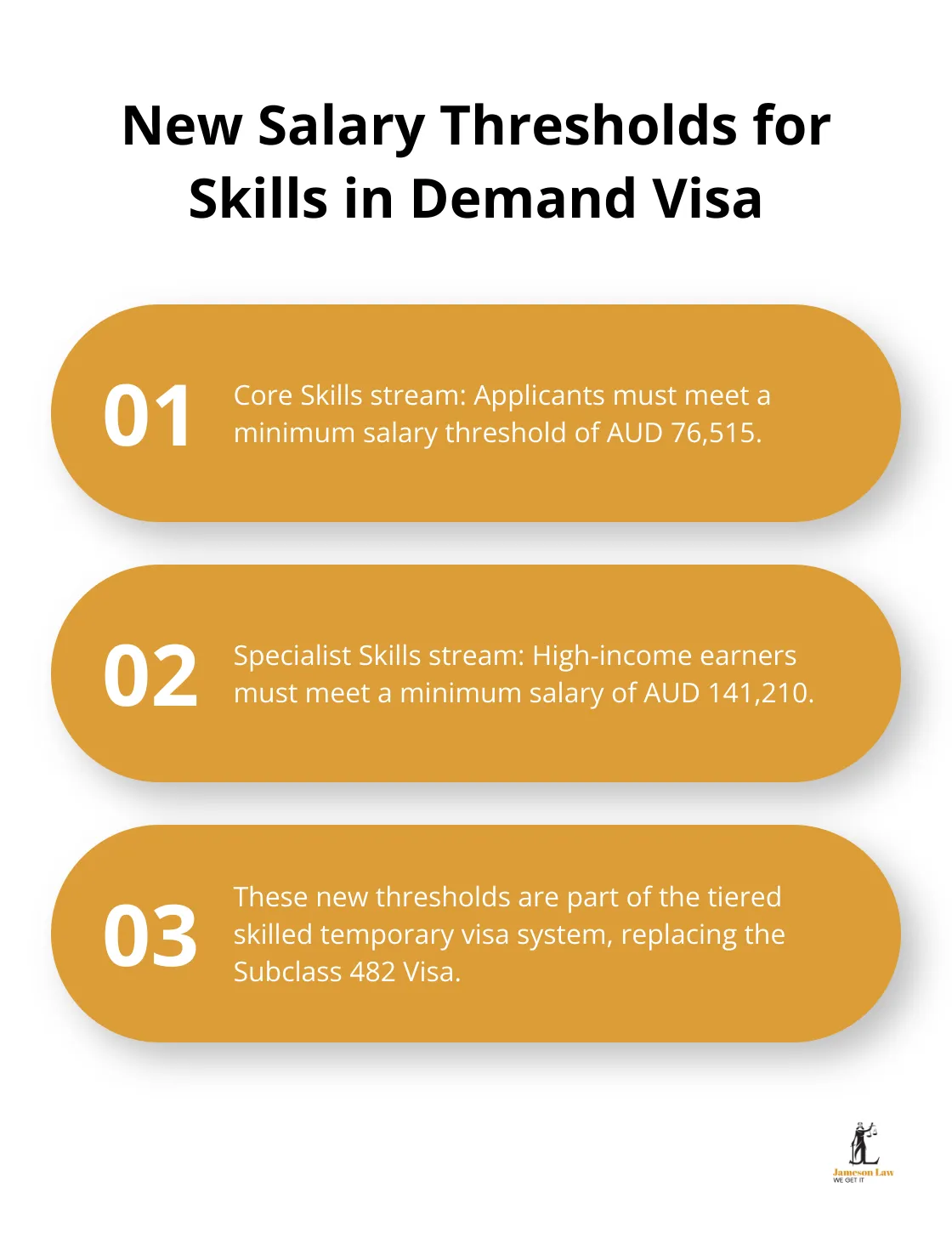Australian immigration changes coming on 1 July 2025 will have financial impacts for visa applicants and current residents alike. There are no fundamental updates encompassing new skilled migrant categories, family reunion visa modifications, or a revised points system for general skilled migration.
At Jameson Law, we’ve analysed these upcoming financial changes to help you understand their impact on various visa types. Our comprehensive guide will walk you through the key updates and provide practical advice on how to prepare for this new era in Australian immigration policy.
Key Changes to Australian Immigration Policies
Skilled Migrant Visa Categories Financial Updates
The Australian government will introduce changes to its immigration policies on 1 July 2025. These updates will transform the financial requirements for visa applicants and current residents. The Skills in Demand Visa remains in place, having previously replaced the Subclass 482 Visa and previously introduced the tiered skilled temporary visa system.
The Core Skills stream will require a minimum salary threshold of AUD 76,515. High-income earners applying for the Specialist Skills stream must meet a minimum salary of AUD 141,210. These changes target critical skill shortages in sectors such as healthcare and renewable energy.

Potential applicants should check if their occupation and salary meet the new requirements before applying. (This step is crucial for a successful application.)
Previous major updates that remain unchanged as of July 2025
Family Reunion Visa Updates
The partner visa application process remains a single-stage model. This change had previously eliminated the need for separate temporary and permanent applications, which should reduce waiting times for applicants.
The Parent visa category remains in its offer of three- or five-year stays with a pathway to permanent residency. This continues to address the backlog in parent visa applications and provide more options for families looking to reunite in Australia. (Families can still plan their reunions with more certainty.)
Revised Points System for General Skilled Migration (Remains Unchanged)
The points-based system for skilled visas continues to award 20 points for applicants with at least five years of relevant work experience (up from 15 points previously). The system also provides additional points for Australian qualifications, promoting local education.
The relatively new ‘skills priority’ component continues to award extra points for skills in high-demand sectors such as healthcare and technology. The Medium and Long-term Strategic Skills List (MLTSSL) still consolidates into a dynamic Occupation Shortage List (OSL) for better assessment of labour market needs.
It is more important than ever to carefully assess your eligibility and points score before applying. Professional legal advice can help you navigate ongoing complex changes and maximise your chances of a successful visa application.
How Different Visa Types Will Change
Student Visa
International students will face the same strict financial requirements. The financial capacity requirement for student visa applicants remains at $29,710. This reflects the cost of living in Australia and aims to ensure students can support themselves during their studies.
The benefits previously introduced remain, where Bachelor’s degree students have permission to work up to 24 hours per week during term time, up from the previous 20-hour limit. Postgraduate students still have unrestricted work rights, opening up more opportunities for practical industry experience.
The Australian government continues to implement the enrolment cap system, which prioritises 80% of applicants from high-priority education providers. Students should research their chosen institutions carefully to ensure they fall within this high-priority category, as the focus is on maintaining the quality of international education in Australia.
Work Visa Adjustments
The Skills in Demand visa, which replaced the old Temporary Skills Shortage visa, continues to bring significant changes for workers. In case you missed the memo, the visa has three streams: Core Skills, Specialist Skills, and Labour Agreements.
As covered above, for the Skills in Demand visa, highly skilled workers earning at least $141,210 can work in Australia for up to 4 years. This stream is aimed at high-income earners.
These changes mean that workers will need to negotiate higher salaries with their employers to meet the new thresholds. Both employers and employees need to understand these new requirements to avoid visa application rejections.
Permanent Residency Pathway
The path to permanent residency remains unchanged. The points-based system for skilled visas still awards 20 points for applicants with at least five years of relevant work experience. This recognises the value of experienced workers and may benefit those who have been in the workforce longer.
Additionally, the government continues to strengthen regional visa incentives to encourage skilled migrants to settle in less populated areas of Australia. This move aims to support regional development and may provide an easier pathway to permanent residency for those willing to live and work outside major cities.
The Parent visa category continues to allow a temporary stay of three or five years with a pathway to permanent residency, and continues to address the backlog in parent visa applications. This offers more flexibility for families looking to reunite in Australia long-term.
Updates to Australia’s immigration system are complex and far-reaching. Professional legal advice can help navigate these changes effectively. The immigration lawyers at Jameson Law can provide tailored guidance to help you understand how new rules apply to your specific situation and maximise your chances of a successful visa application or transition to permanent residency.
The next chapter will explore practical steps you can take to prepare for new immigration rules, including understanding the requirements, updating your documentation, and seeking professional legal advice.
How to Navigate Immigration Rules
Stay Informed About Policy Updates
The Department of Home Affairs website provides the most up-to-date information on visa requirements and policy changes. You should check their news section regularly or set up email alerts to stay ahead of any modifications to the immigration rules. The Government’s Migration Strategy was released on 11 December 2023 and outlines a new vision for Australia’s migration system.
Get familiar with the Skills in Demand visa that replaced the old Temporary Skills Shortage visa. You must familiarise yourselves with the three streams: Core Skills, Specialist Skills, and Labour Agreements. Each stream has specific salary thresholds and eligibility criteria that you must meet. This SID visa program is intended to simplify and streamline visa processing, target temporary skilled migration to address skill needs, and promote worker protection.
Assess Your Eligibility
The points system for skilled visas requires you to assess your eligibility. If you’re close to this threshold, you should consider ways to gain additional experience before applying.
You need to check if your occupation is on the new Occupation Shortage List (OSL), which will replace the current Medium and Long-term Strategic Skills List (MLTSSL). This dynamic list will better reflect Australia’s labour market needs and could impact your visa options.
Update Your Documentation
You should start gathering and updating your documents well in advance. Often, new rules may require additional or different documentation than previous requirements.
You must ensure all your qualifications are properly assessed and recognised in Australia. With the new emphasis on Australian qualifications in the points system, you should consider whether further local education could boost your application. Alternatively, look into Recognition of Prior Learning programs or similar qualification or skill recognition programs.
For work visas, you need to obtain detailed employment contracts that clearly state your salary. This is particularly important with the new income thresholds for the Skills in Demand visa streams.
Seek Expert Legal Guidance
The complex changes can challenge you. Professional legal advice will help you understand how the new rules apply to your specific situation. An experienced immigration lawyer can help you interpret the nuances of the policies and develop a strategy tailored to your circumstances.
We at Jameson Law specialise in providing up-to-date advice on Australian immigration law. Our team can guide you through the intricacies of the new visa categories, help you maximise your points score, and ensure your application meets all the new requirements.
Prepare for Regional Opportunities
The immigration rules continue to strengthen regional visa incentives. You should consider opportunities in less populated areas of Australia. This move could provide an easier pathway to permanent residency for those willing to live and work outside major cities.
You need to research regional areas that align with your skills and career goals. Understanding the local job market and lifestyle in these regions will help you make an informed decision about where to settle.
Final Thoughts
The Australian immigration changes seem to continue to transform the country’s approach to skilled migration, family reunification, and international education. Updates since July 2023 continue to address critical skill shortages, streamline visa processes, and promote regional development. The introduction of the Skills in Demand visa, with its tiered system and, recently, the increased salary thresholds, continues to reshape the landscape for skilled workers seeking opportunities in Australia.
Family reunion visas have improved, including the streamlined partner visa process and parent visa options. The revised points system for general skilled migration rewards experienced professionals and those with Australian qualifications. Student visa holders benefit from increased work rights, but also face stricter financial requirements. (These changes underscore the importance of staying informed and prepared as the immigration landscape evolves.)
Navigating these complex changes can challenge applicants, which is why professional legal guidance proves invaluable. At Jameson Law, we specialise in providing up-to-date advice on Australian immigration law. Our experienced team can help you understand how these new rules apply to your specific situation, guide you through the visa application process, and develop strategies to maximise your chances of success.










